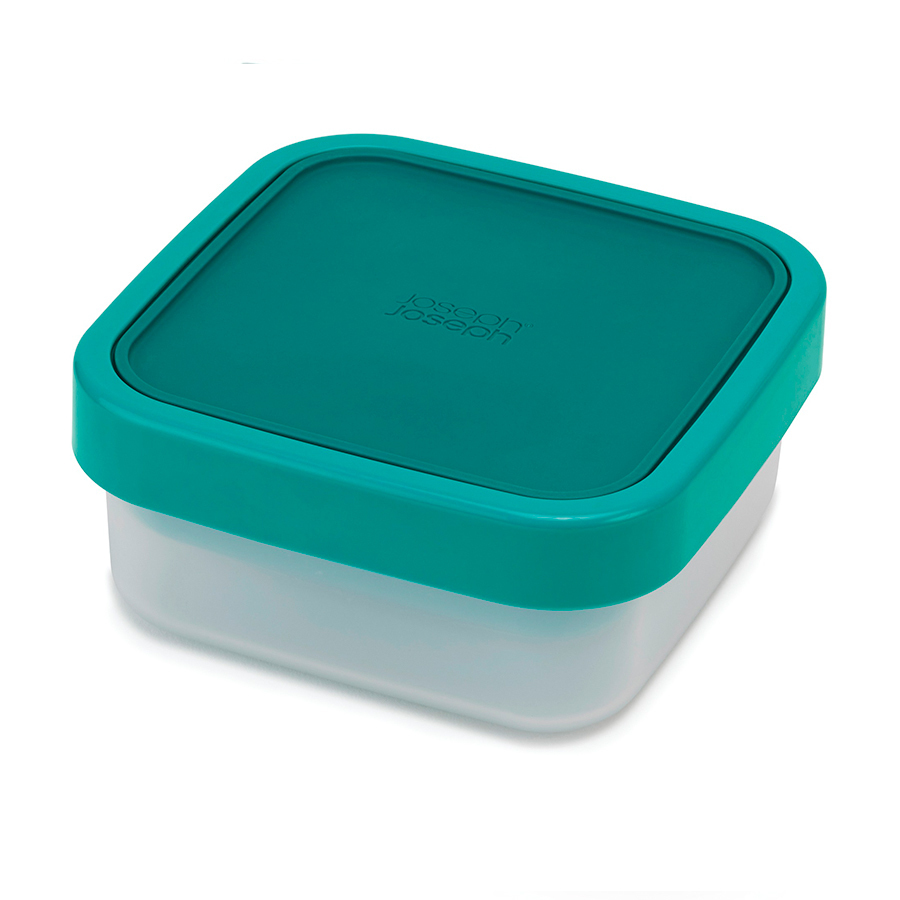In the design of even the smallest garden, aesthetic perception plays a major role. It is important to achieve a harmonious combination of flowers, trees, shrubs and other plants. In order for the lilies to effectively fit into the landscape design of the garden, it is necessary to carefully consider their combination with the existing ornamental plants and other elements.
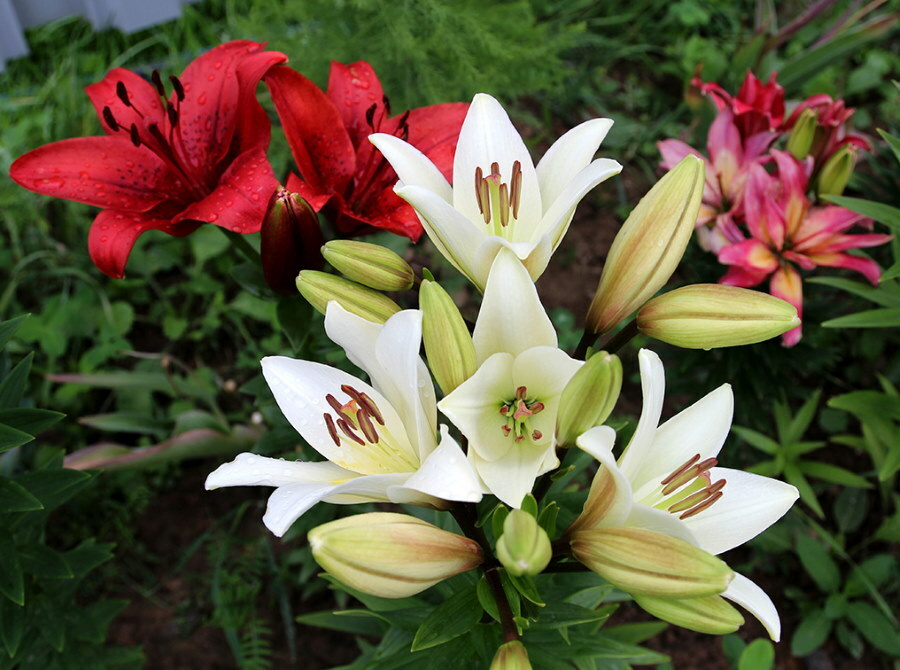
The modern variety of lily varieties not only surprises and delights, but can also baffle even an experienced gardener.
How to use lilies in the landscape design of a garden, cottages
Content
- How to use lilies in the landscape design of a garden, cottages
- The best types and varieties of lilies
- Asian hybrids
- American hybrids
- Snow white hybrids
- Selecting a variety for single plantings
- Selection of neighbors for a flower bed with lilies - flowers and herbs
- Video: How to properly plant and transplant lilies
- Photos of examples of compositions
An exotic and mysterious flower is the garden lily. She may well share the title of queen with a rose. Hybrid varieties and tubular lilies are very popular, attracting attention not only for their beauty, but also for their healing qualities.
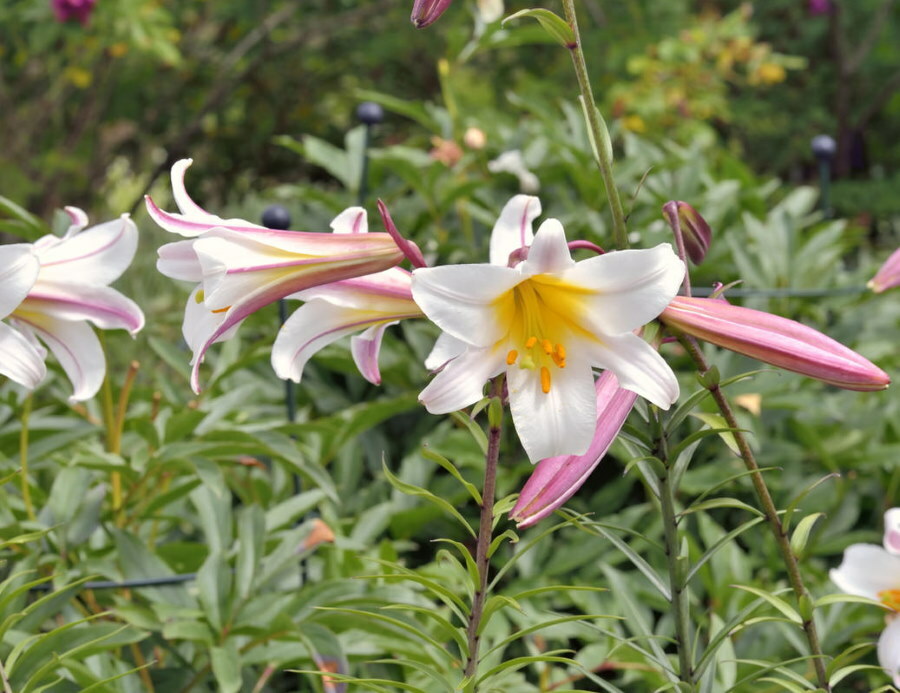
A typical representative of tubular hybrids is the king lily L. regale
For our climatic conditions, experienced gardeners advise choosing the following types: Crystal Star, Merostar, Regale, Narbona, Grand Gru.
Rare varieties:
- Red: African Lady, Black Beauty, Delight Scarlet.
- White: Virginel, Spezum Album, Bend Gold.
- Pink: drooping lily, Rubrum Speziosum, Lancon.
- Orange: lily of David, Henry, leopard.
- Yellow: Hanson's lily, Leuchtlin, Canadian, dwarf.
The listed species look very impressive as bright touches in the garden landscape. Competently using these flowers, you can create spectacular flower beds, flower beds and mixborders that will decorate the summer cottage and delight the eye from the beginning to the end of summer.
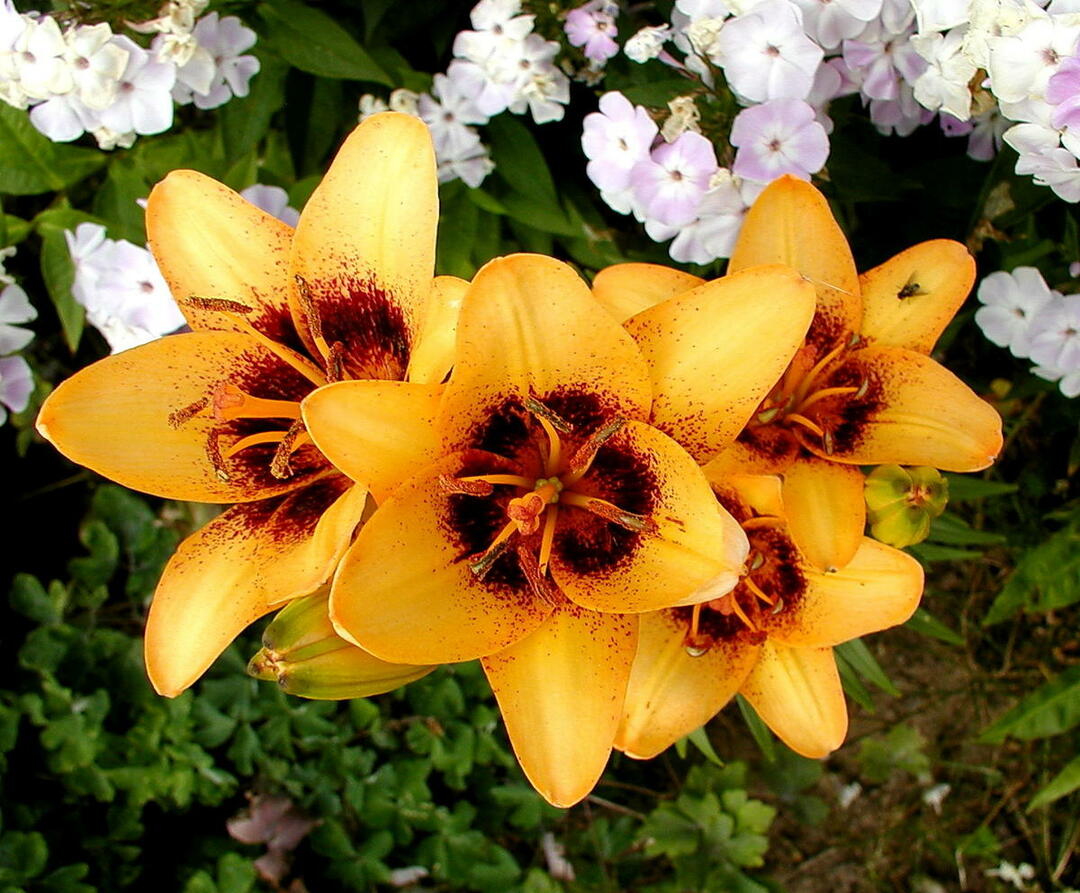
Lily Apicot Pixels with dense contrasting speck from the tango cultivar
Most often, lilies are planted in groups, in separate islands of different varieties, or in combination with other perennials and annuals. Low-growing flowers are used to create spectacular colorful borders, higher varieties are more appropriate in the background a flower garden as a background, as well as separately growing islands for masking unaesthetic elements of the garden or buildings.
Before placing lilies in the garden, it is worth deciding which type of planting to choose:
- Single.
- Group.
Depending on the planting scheme, the required variety of lilies is selected based on the following parameters:
color palette:
- The size and shape of the flower.
- Stem height.
All the beauty of lilies is best emphasized by evergreen cypresses, thuja and junipers.
The best types and varieties of lilies
Lilies are perennial bulbous flowers with a huge selection of colors. All available varieties, of which there are more than 3500, are divided into 9 classes depending on wild-growing ancestors and growing conditions: Asian, American and Oriental hybrids, long-flowered, tubular, Marchagon, Candidium, LA hybrids and OT hybrids, species lilies. They can be bushy or upright. The size of the peduncle varies from 60-180 cm, the diameter of the flowers is from 2.5-30 cm. They bloom almost all summer, develop from the bulb.
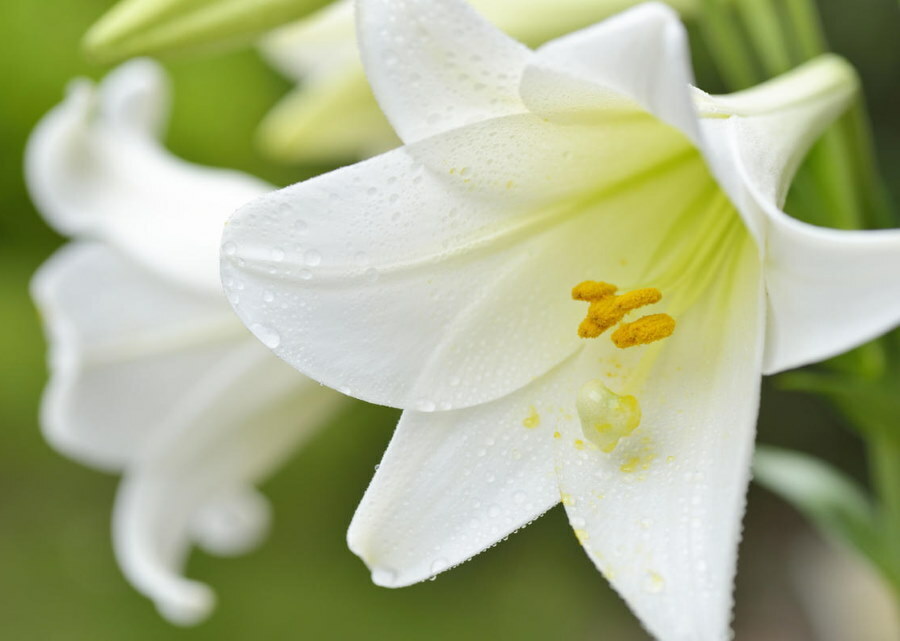
Long-flowered hybrids look interesting, the flowers of which resemble an old gramophone (in the photo, the Snow Queen variety with a cream center in a white flower)
The creation of new varieties and hybrids of lilies, distinguished by a rich palette of all kinds of shades and the uniqueness of decorative properties, contributes to the conquest of leading positions in landscape design. The most common hybrid varieties include:
- asian;
- American;
- snow-white.
Asian hybrids
These varieties reach a height of 50-100-150 cm and have flowers with a diameter of about 8-15-20 cm, which bloom in June. All flowers have 6 petals. The flower shape is turbid or cupped.
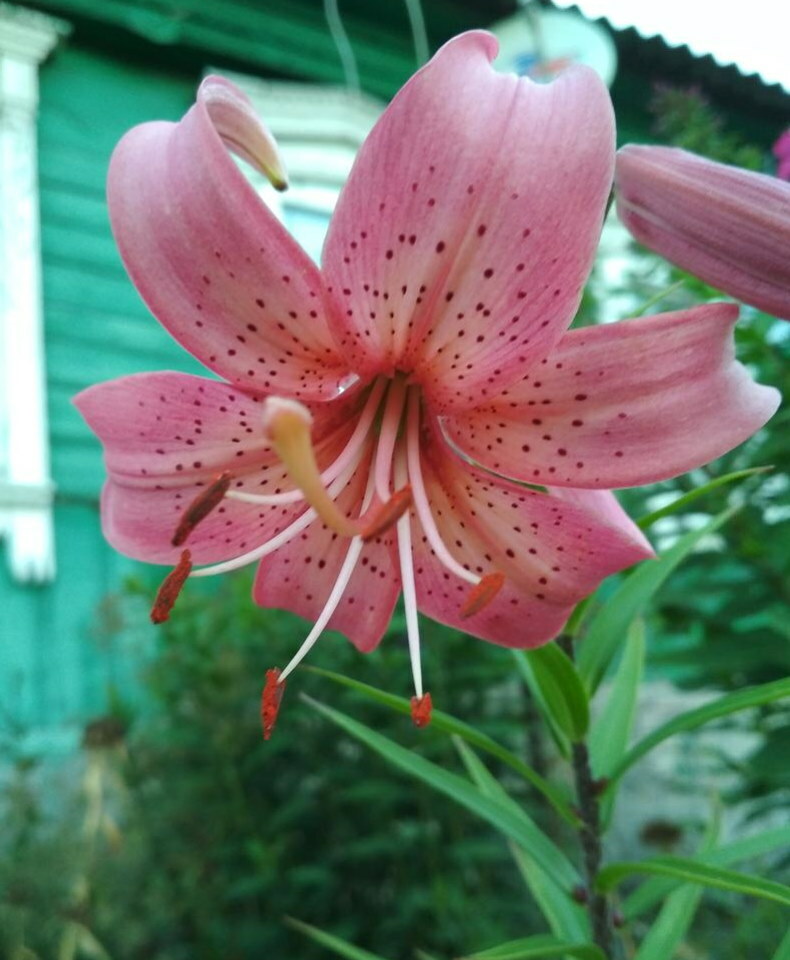
Asiatic lily with a turban-shaped flower
In relation to the stem, the flowers are directed:
- to the sides (horizontal);
- up (upward looking);
- down (drooping).
Asian hybrids, with the exception of some varieties, are odorless, which is great for allergy sufferers.
They are distinguished by a wide range of shades that can go up to burgundy and almost black, as well as combine two or three colors at the same time:
- Reds: Solfarino, Black Out and Jack, Landini, Cocktail Twins, Hiawatha, Olina, Linda, Matrix.
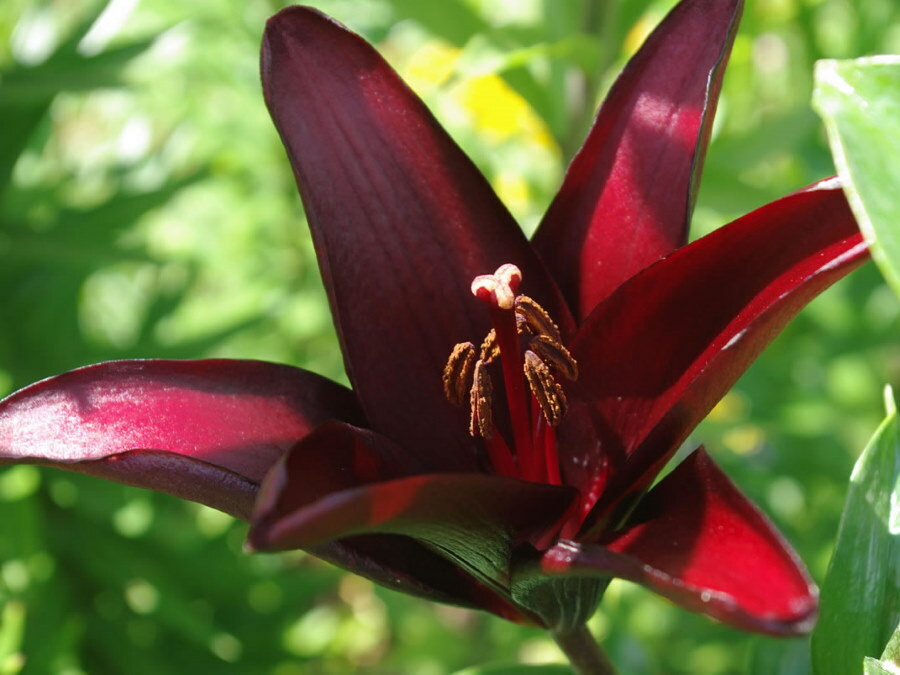
Lily Landini - mystical, red-burgundy and even almost black when viewed from a certain angle in cloudy weather
- Yellow: Fata Morgana, Graffiti, Black Spyder, Top Line, Vali Sun, Golden Stone.
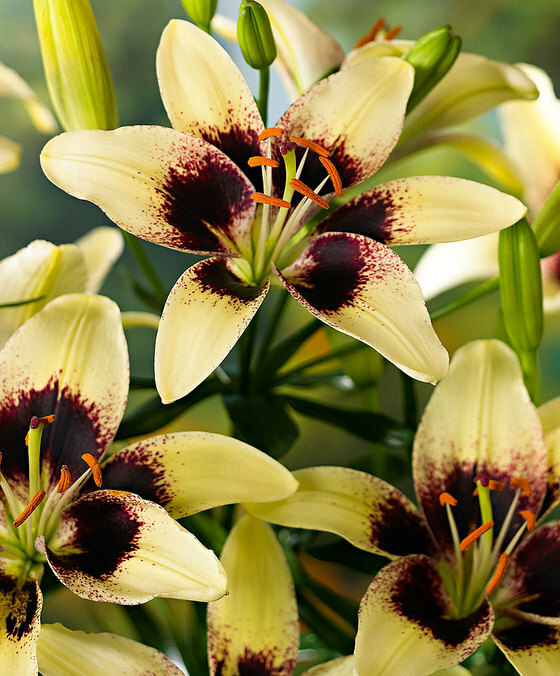
Creamy yellow Black Spyder lily flowers can grow up to 20 cm
- Orange: Pearl Justin, Apricot Pixel, Loreta, Bullfighting, Orange Art and Electric.
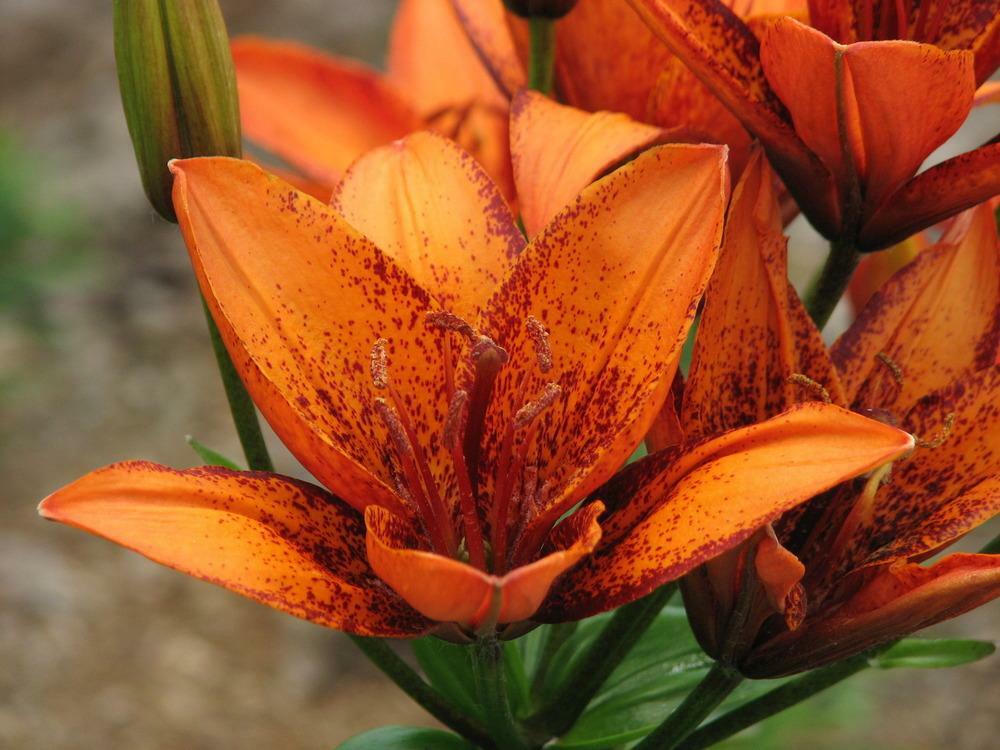
Lily Orange Art with bright orange flowers
- Purple: Push Off, Nettez Pride, Double Sense, Purple Eye or Life, Night Flyer.
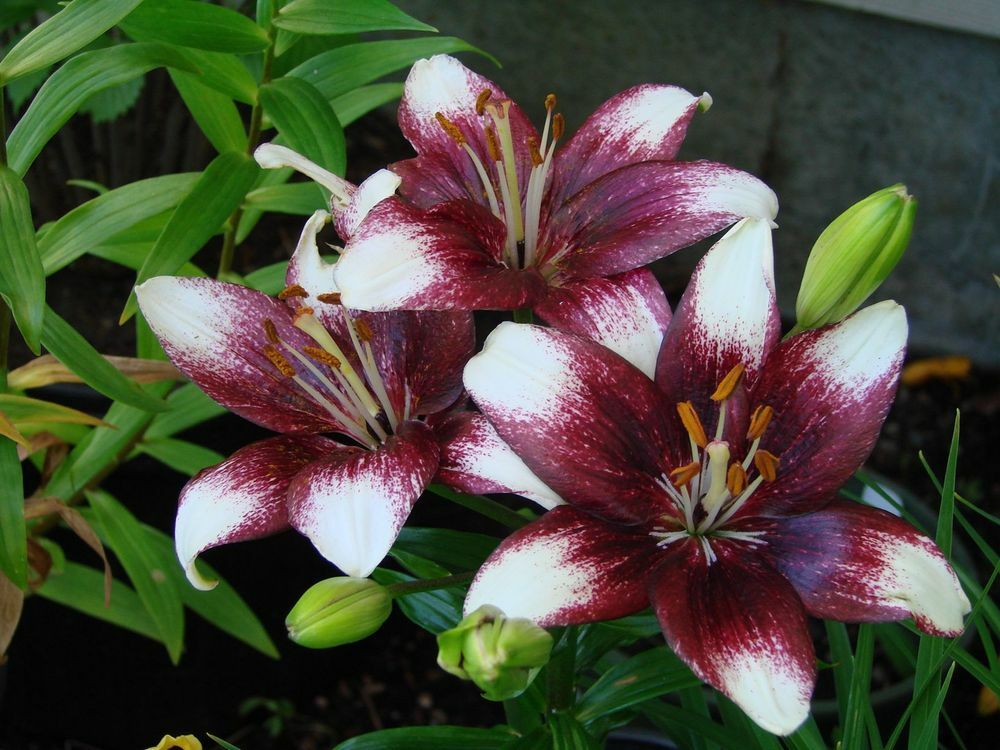
Push Off variety with white spots on the tips of the petals
- Pink: Delilah, Iowa Rose, Lollipop, Arosa Juel, Vermeer, Chianti.
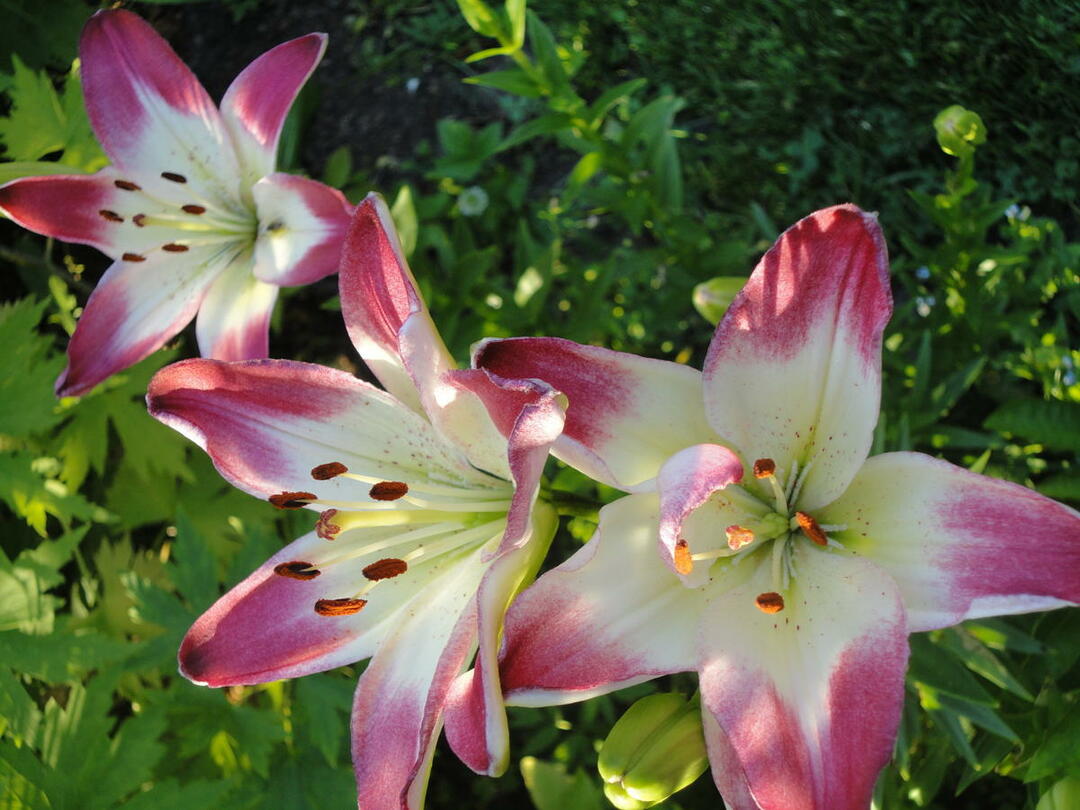
Asian lily Lollypop variety with white and pink flowers
- Whites: Annamari Dream, Crossover, Costa, Navona.
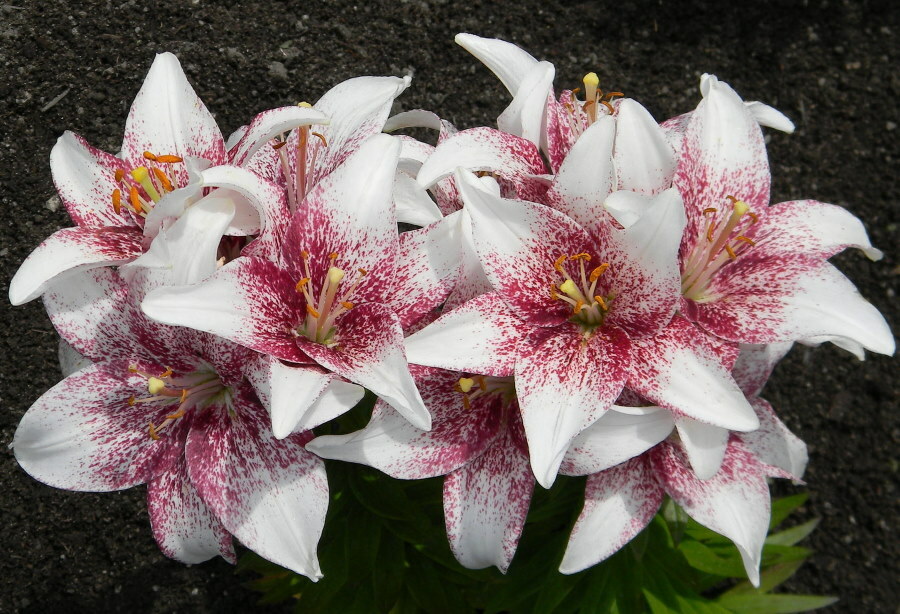
Lily Crossover with dark burgundy crop and orange stamens
Asian hybrids grow well in both sun and partial shade. They are unpretentious to care for, tolerate cold well and hibernate in the open field without any problems.
Photos of hybrid lilies in garden landscaping:
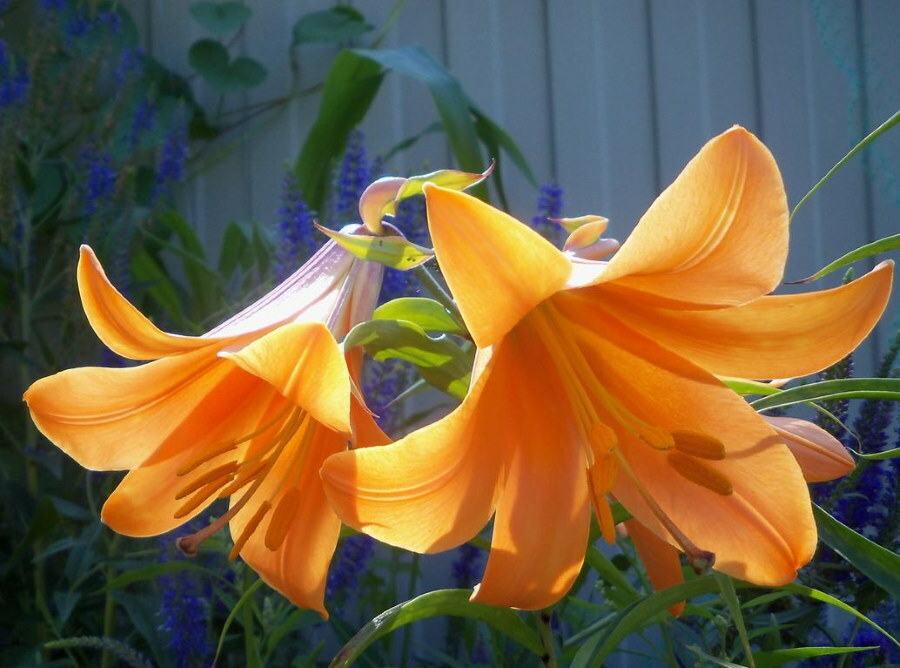
Orange "gramophones" of a tubular lily
Asian LA hybrids are plants with a tall, strong, erect stem, reaching a height of 1-1.3 m, with velvety foliage. The incredibly beautiful velvety tubular flowers, directed upward, bloom in July. They are about 25 cm in diameter. They are resistant to disease and frost.
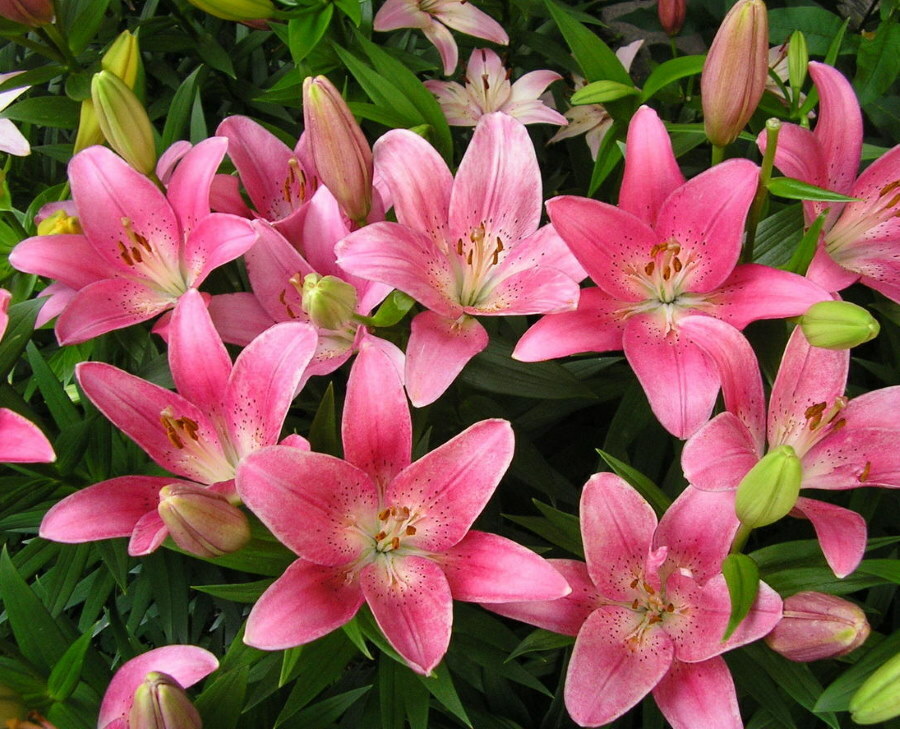
LA hybrids have a delicate aroma, unlike "pure" Asians
Hybrids of Asian and Oriental lilies, the so-called OA hybrids, have flowers about 18 cm, directed upwards. This is a new kind of flowers:
- yellow: Sunny Crown, Yellow Power, Nanjing;
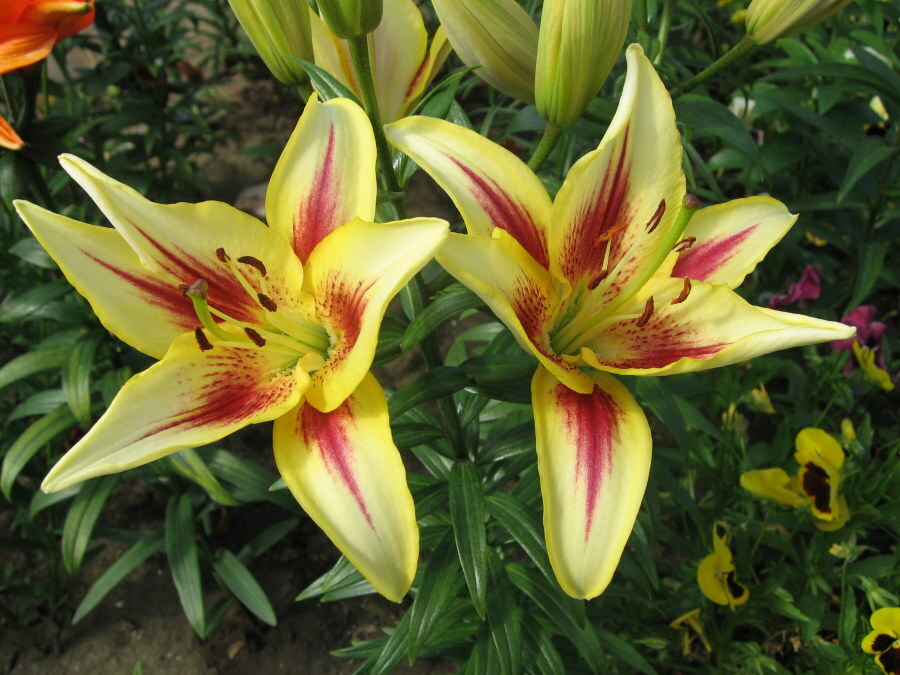
Hybrid lily variety "Sunny Crown"
- pink-red: Elegant or Fest Crown, Red Power, Kokopa.
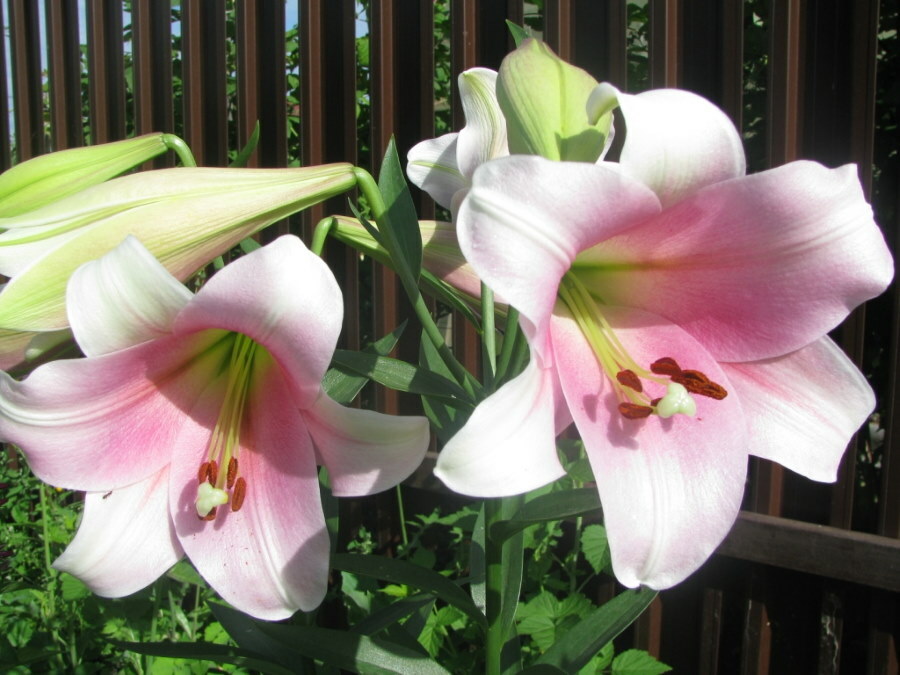
Long-flowered hybrid cultivar "Elegant"
American hybrids
The emergence of American hybrids begins in 1871 from the leopard lily, which was introduced into the culture back in 1848. This species remains the most popular and widespread to this day among other American lilies.
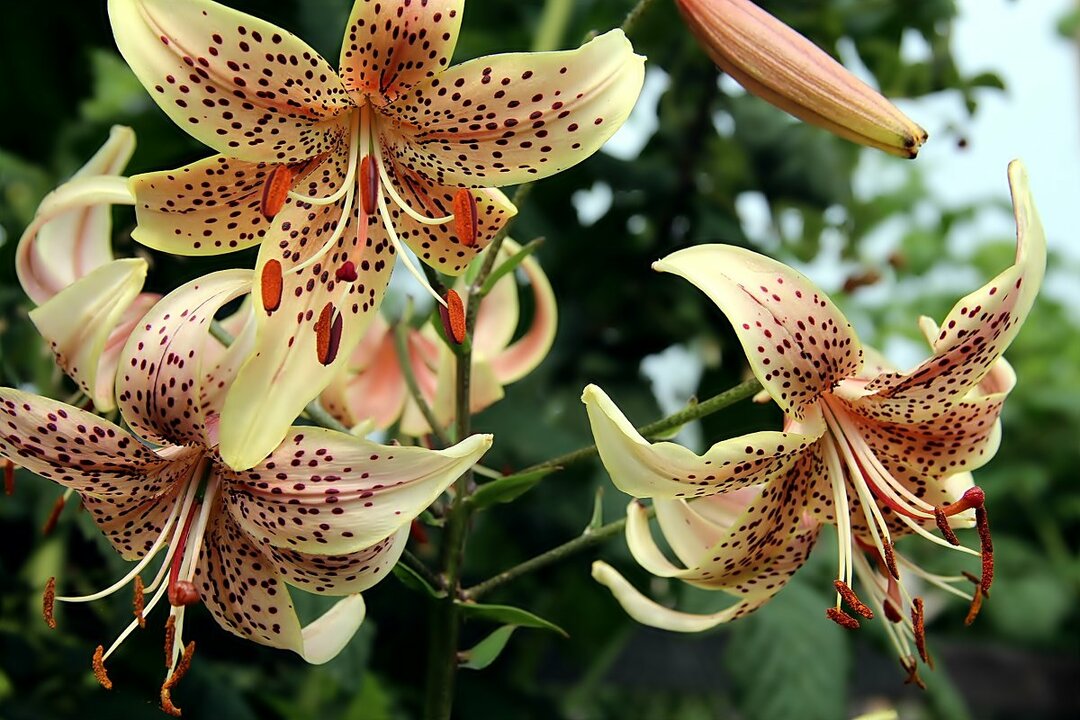
Leopard lily grade "Brazil"
Flowers of this group originate from the leopard lily (Bolander, Parry, Kellogg), as well as from the Canadian, Colombian and other representatives of North America. They are adapted to hot dry summers and mild winters. Most common in the mountainous areas of the Atlantic and Pacific coasts.
American hybrids don't like transplanting. Grow well in slightly acidic soil with proper drainage.
Suitable for growing in central Russia, they tolerate winters quite well and are quite frost-resistant. However, all lilies growing in central Russia are advised to cover for the winter.
Flowerbeds with lilies in the country photo:
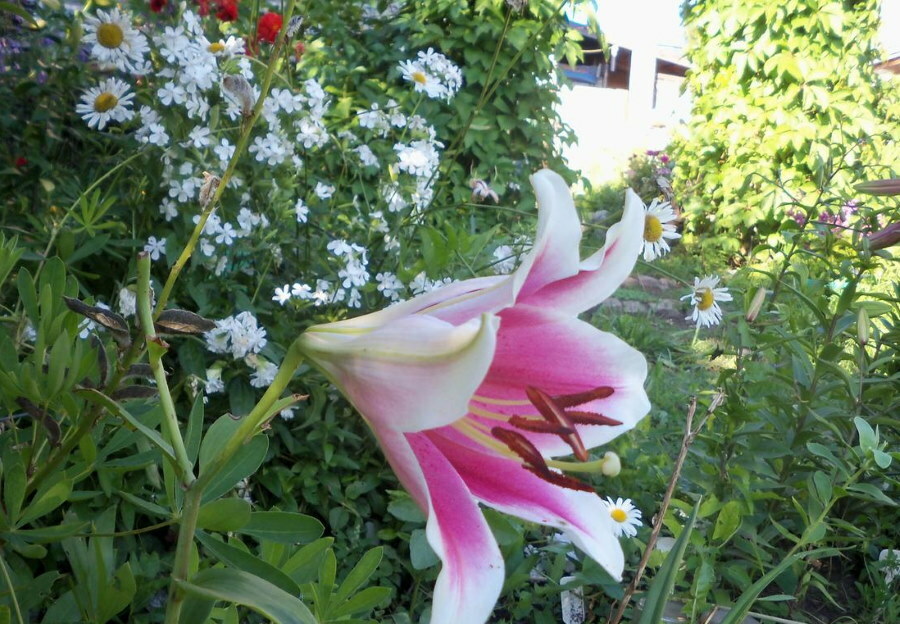
Pink and white lily "Eagle" against the background of garden daisies
Snow white hybrids
The most popular is the white lily - it has a delicate and unique aroma. This type is irreplaceable in wedding bouquets and is in demand in all countries of the world. An interesting fact - all bulbs are edible, in China they are consumed fresh and dried. Today there are about 110 species, of which 2000 are hybrid.
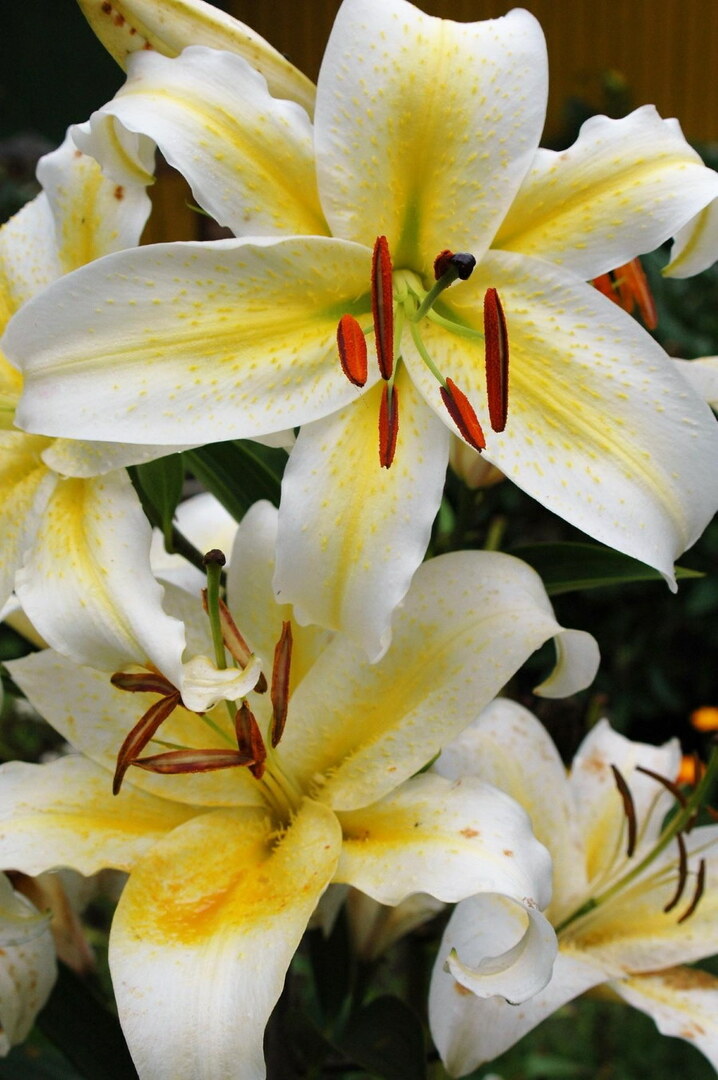
Snow-white hybrids are distinguished by petals with curved tips, the flowers are most often white with yellow accents in different places
Candidium hybrids were obtained by crossing the snow-white chalcedony lily and European species. They are less hardy, but they are the ancestors and have been in culture since ancient times - the oldest group.
The new group of white lilies Oriental and Longiflorum are LO hybrids with funnel-shaped flowers. These include: Global Beauty, White Triumphant, Illusion.
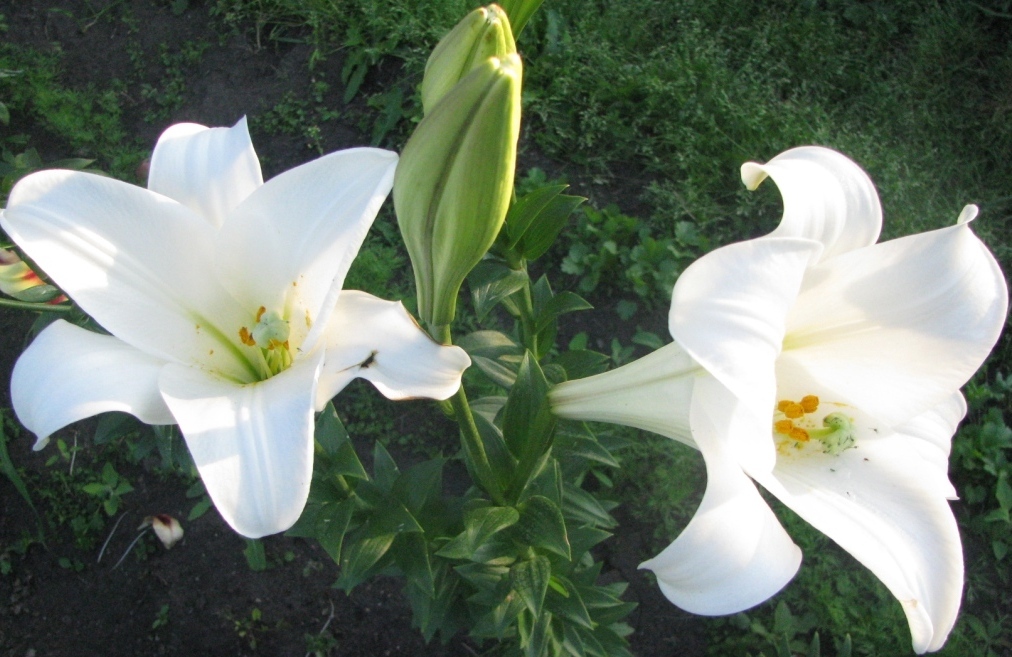
White lily "Global Beauty" perfectly tolerates the climate of Central Russia
One of the newest hybrids, obtained in the process of crossing three plants - LOO-hybrid. Luxurious representatives of the lily family, striking with a beautiful snow-white plafond flower, reaching a diameter of about 40 cm. These include varieties: White Triumph, Bright Brilliant, Nuance Polar, Eagle.
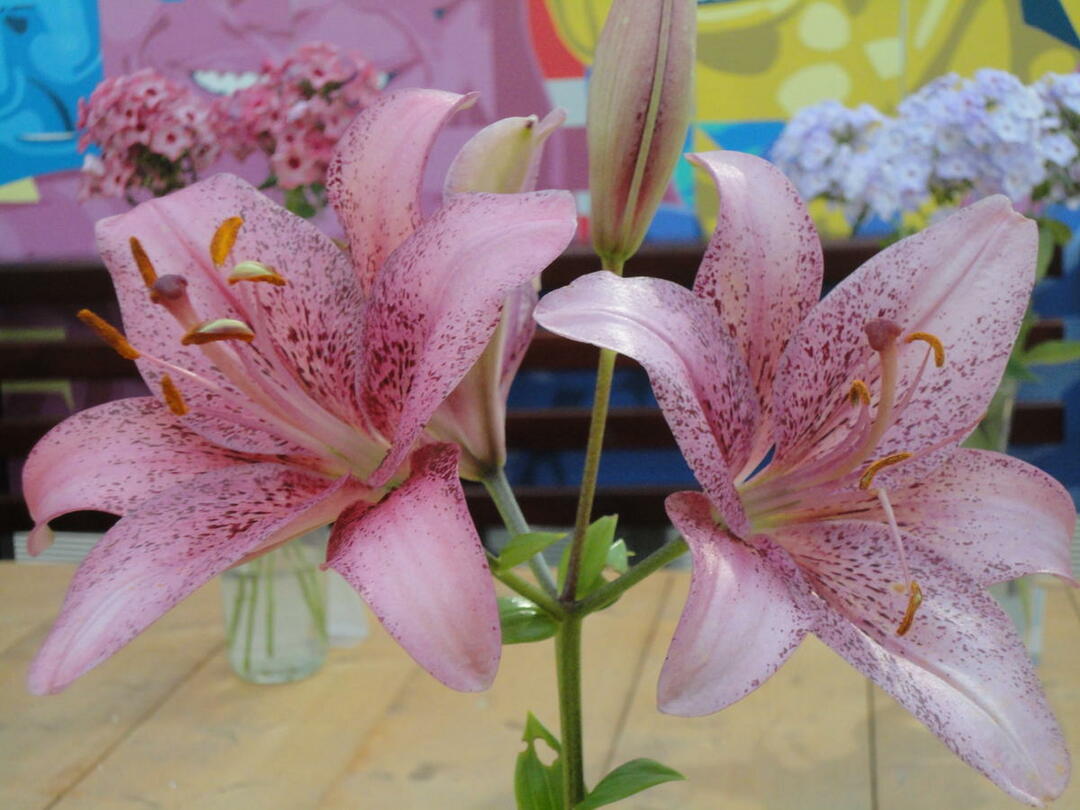
LOO hybrids are distinguished by large flowers and a strong aroma (in the photo, the Spot On variety)
Selecting a variety for single plantings
Due to their expressive outlines, attractive inflorescences, spectacular foliage and an erect stem, lilies are often used for single plantings in landscape design. For these purposes, the following varieties are better suited: golden lily, Regale lily, Candidum lily, tiger lily, turban lily.
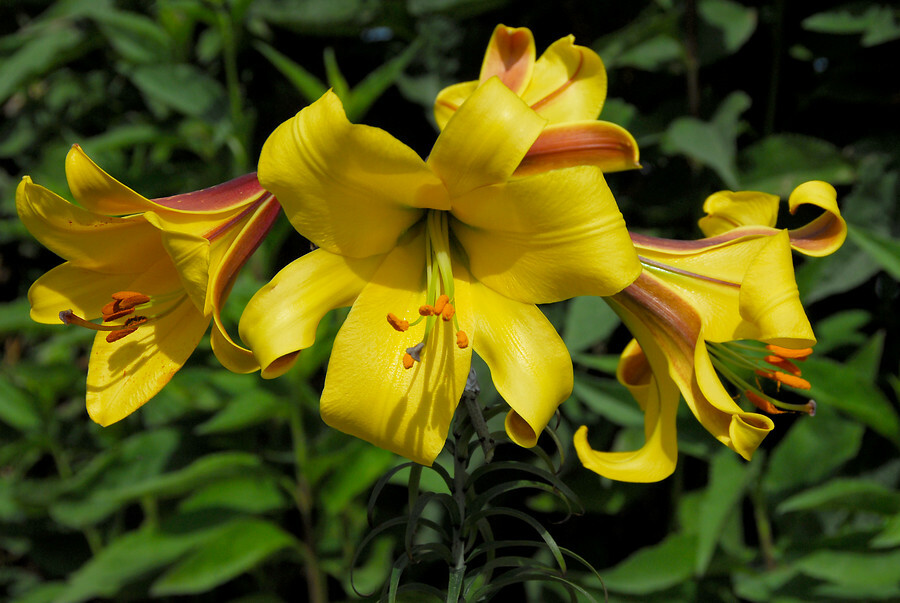
Lily "Golden Splendor" is perfect for single landings
As a single planting, tapeworm lilies look spectacular on a hillock located in the middle of a lawn or an alpine slide. Trees are a good background for single plantings - the dense crown of foliage further emphasizes all the advantages of a regal flower.
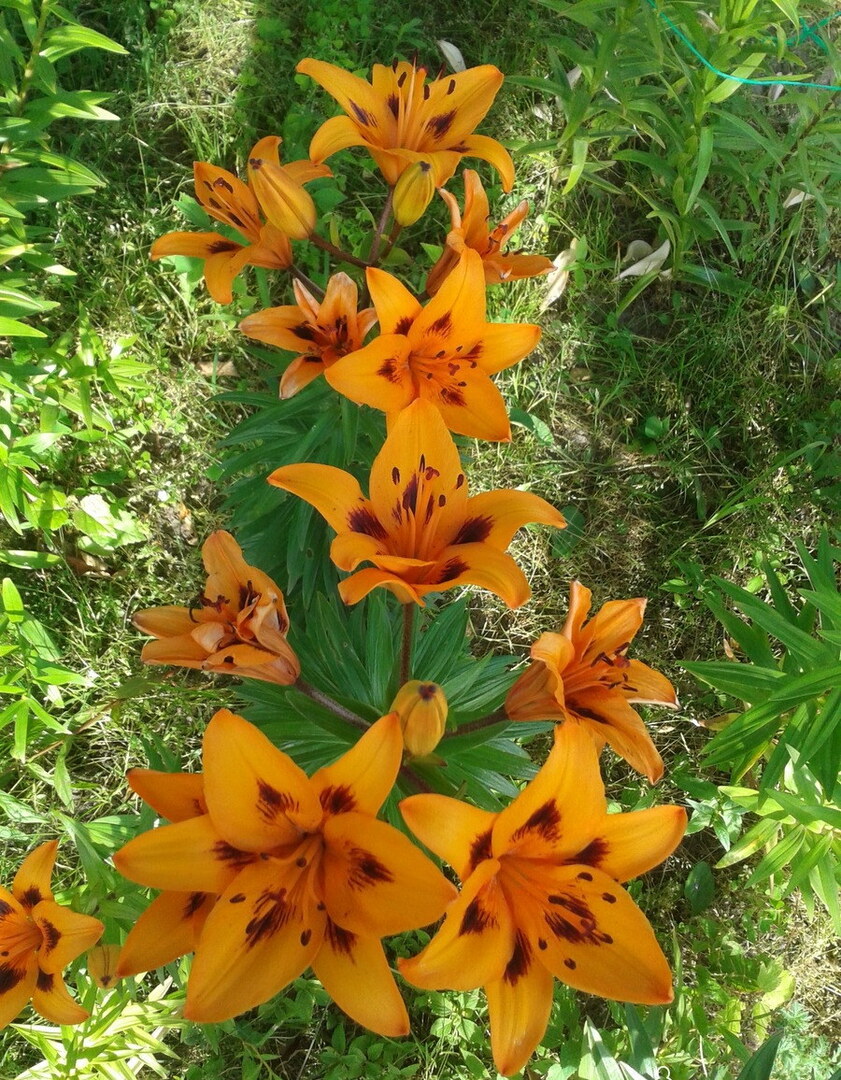
The brightness and grace of the lily flower make it the center of any garden composition.
Low-growing varieties look great along the paths. Mixbroders are selected to ensure that their beauty delights throughout the summer. Low tubular varieties with white inflorescences, as well as the Thunberg lily, blooming in May-June, with bright orange speckled flowers, are perfect for planting along the paths.
An alpine slide in combination with moss and herbs can be beautifully decorated with a drooping lily, which is distinguished by delicate turban-shaped flowers in lilac-pink tones. It reaches a height of 40-60 cm.
High varieties of lilies are good for camouflaging a fence, at the same time clearly and unusually delineating the boundaries of the site.
Lilies in the garden photo site design:
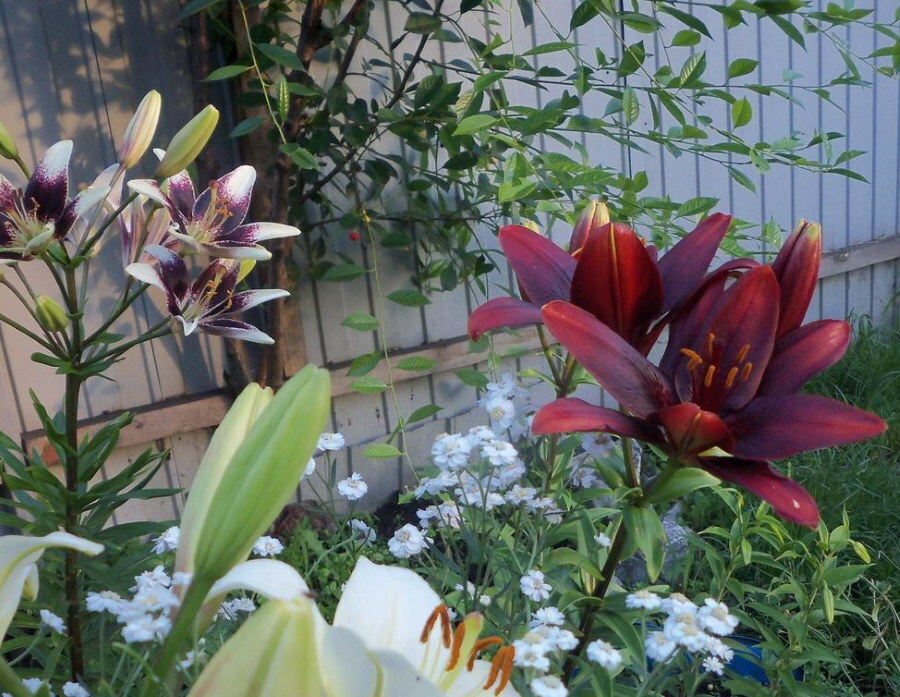
Dark beauty - Asiatic lily "Mapira"
Varieties for single planting are selected so that they stand out well against the general background due to their bright color: hybrids of rich orange, yellow or red shades.
Selection of neighbors for a flower bed with lilies - flowers and herbs
Lilies are in harmony with peonies, delphiniums, ferns, junipers, alyssum and astilbe. Given the shades and compatibility with other plants in shape and texture, they are often placed in curtains.
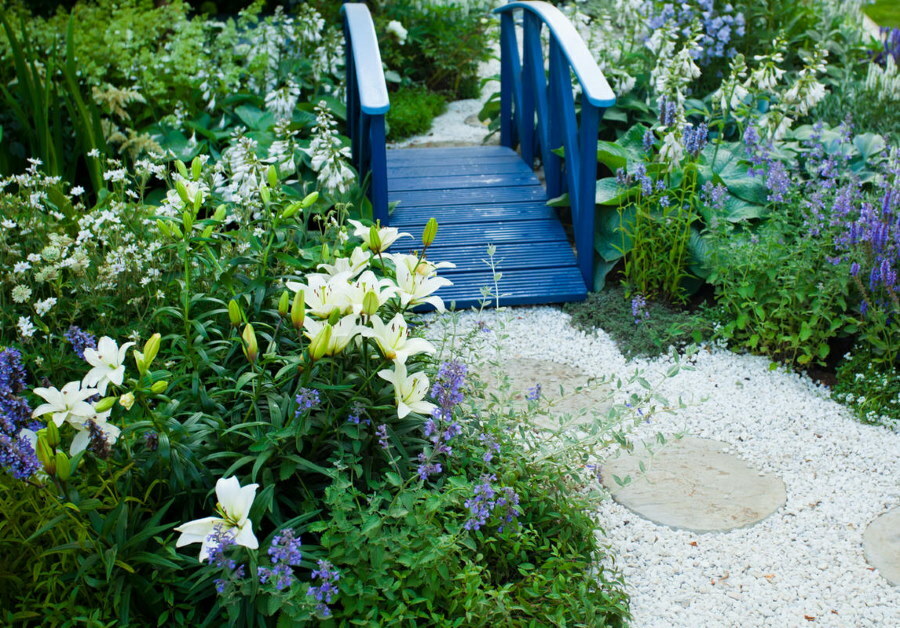
Good neighbors - white lilies and blue delphiniums
Lilies of various varieties, selected according to the size and color of the buds, form landscapes of fabulous beauty and fascinate the eyes of people passing by.
A flower bed formed from lilies of various shapes and colors will be perfectly complemented by the neighborhood of perennial shrubs, evergreens and grass lawns. In the foreground of the lilies, the snow-white Iberis bushes look very gentle, preserving their green foliage all year round.
Photo of lilies in a flower bed with other flowers:
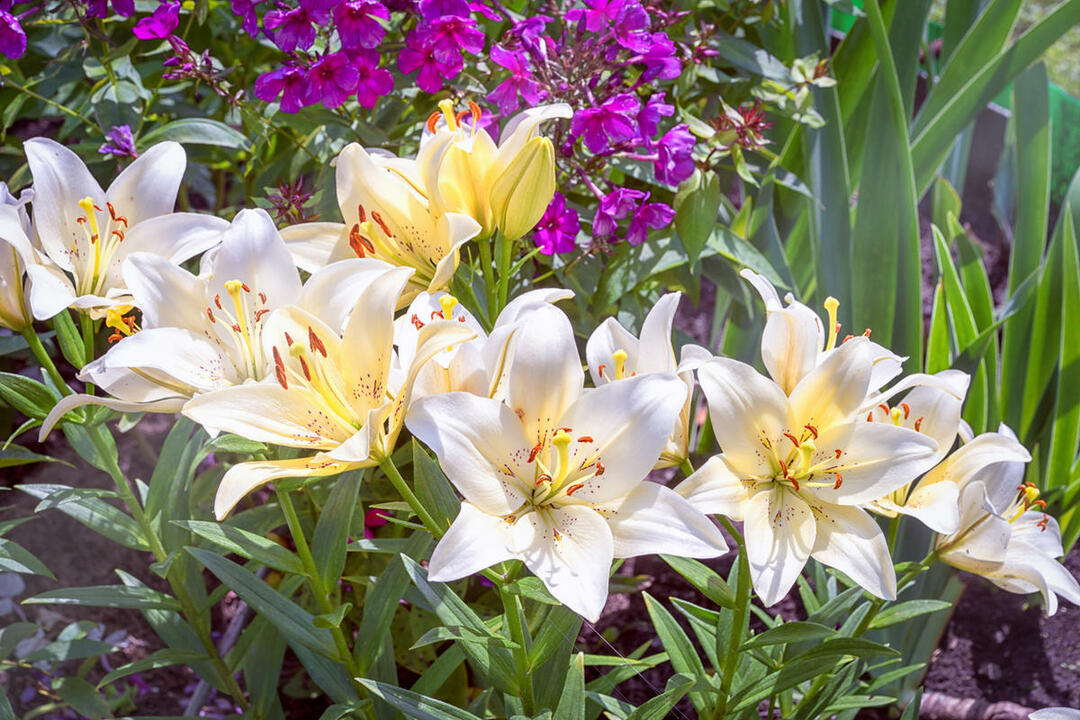
Lilies of white varieties look great against the background of bright phlox
Another option for a wonderful tandem is lily and alissum, which, gradually expanding, will form a chic green carpet, strewn with delicate inflorescences of white very small flowers.
Delicate lilac lilies will exquisitely complement the rabatka, due to the contrast of silvery and emerald shades of shrubs, in combination with a grassy lawn. A wonderful neighborhood - lilies with small bushes with decorative foliage and unusual long peduncles - the so-called heucheras.
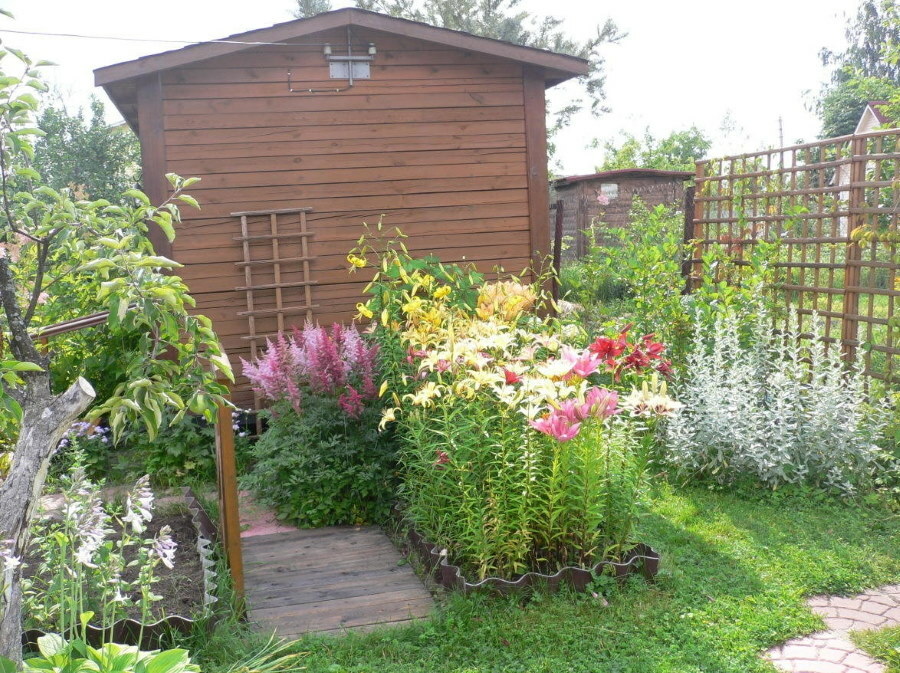
Picturesque lilies with long stems can be used to cover a shed or decorate a fence at a summer cottage
Pink shades go well with plants with large spreading leaves. For yellow flowers, a good background can be: magnolia, euonymus, barberry, rhododendron. For white lilies, lilac phlox or pale pink hydrangeas will form a favorable background.
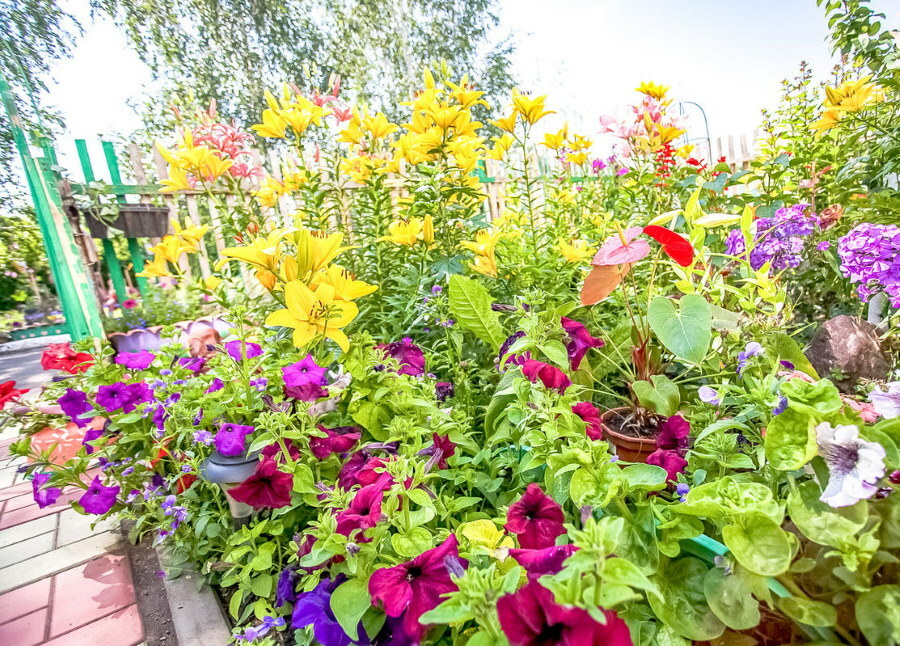
The foreground in front of the lilies can be covered with any annual flowering plants, for example, a petunia of a contrasting color.
Breeding new varieties and hybrids that amaze with their beauty, rich decorative palette and disease resistance, allows lilies expand the horizons of landscape design and take a leading position in decorating flower beds, borders, ridges and all kinds of compositions in decoration garden.

